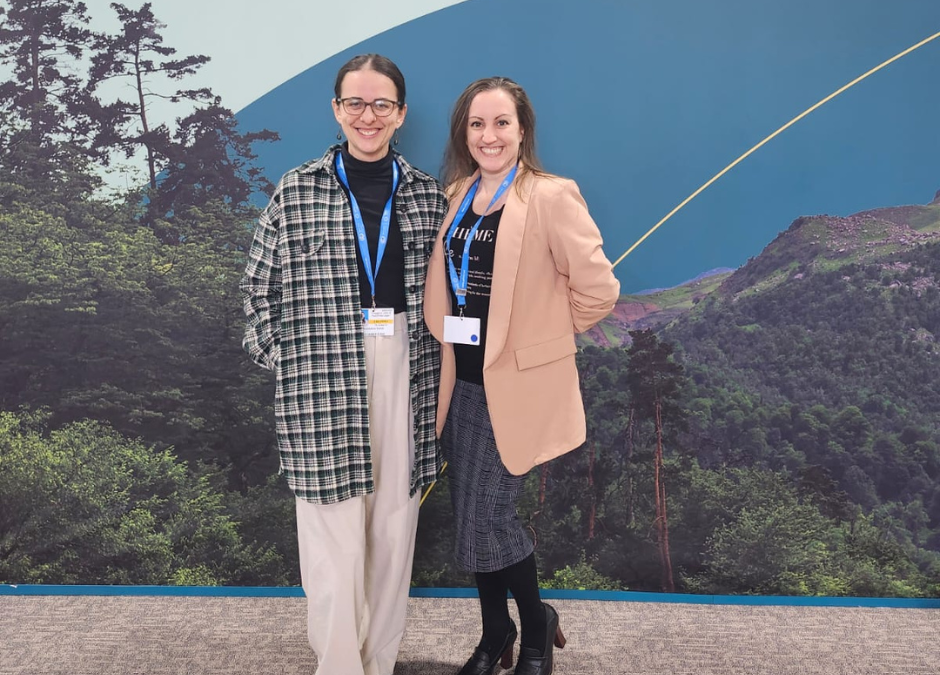COP29 in Baku was a crucial platform for advancing our vision of inclusive and transformative climate justice. From 11 to 22 November 2024, Mission inclusion maintained an active and strategic presence, participating in critical events and contributing to dialogues on climate finance and inclusion.
Mission inclusion was represented by two of our colleagues: Geneviève Morency, Programme Director for East Africa, and Andréanne Martel, Senior Project Manager for ReSea. Their active participation highlighted our distinctive approach combining climate justice, inclusion and social transformation.
COP29 in Baku was a crucial platform for advancing our vision of inclusive and transformative climate justice. From 11 to 22 November 2024, Mission inclusion maintained an active and strategic presence, participating in critical events and contributing to dialogues on climate finance and inclusion.
Mission inclusion was represented by two of our colleagues: Geneviève Morency, Programme Director for East Africa, and Andréanne Martel, Senior Project Manager for ReSea. Their active participation highlighted our distinctive approach combining climate justice, inclusion and social transformation.
Collaboration and dialogue
Dialogue with the Canadian delegation
One of the highlights of our participation was our intervention at the meeting with the Canadian delegation. Faced with representatives of the Canadian government, we raised crucial questions about the mainstreaming of gender and inclusion in the COP29 negotiations. Our intervention was based on the importance of maintaining a strong language on rights, particularly in a context of potential setbacks.
In particular, we invited the negotiating team to focus on two fundamental aspects:
- Their strategy for ensuring gender mainstreaming and inclusion in all negotiated texts
- The potential for collaboration between Canadian civil society and the negotiating team to advance the feminist agenda.
Working with civil society in Canada and Quebec
Our participation was part of a collective approach with the AQOCI delegation, which included colleagues from Développement international Desjardins, Socodevi, and Avocats sans frontières Canada and other Canadian organizations working in international cooperation.
We were also actively involved in the Climate Action Network (CAN-RAC) delegation, providing daily follow-ups on the official negotiations of the working document on gender and climate.
This collaboration helped strengthen the voice of Canadian and Quebec civil society in discussions on climate justice.
Collaboration and dialogue
Dialogue with the Canadian delegation
One of the highlights of our participation was our intervention at the meeting with the Canadian delegation. Faced with representatives of the Canadian government, we raised crucial questions about the mainstreaming of gender and inclusion in the COP29 negotiations. Our intervention was based on the importance of maintaining a strong language on rights, particularly in a context of potential setbacks.
In particular, we invited the negotiating team to focus on two fundamental aspects:
- Their strategy for ensuring gender mainstreaming and inclusion in all negotiated texts
- The potential for collaboration between Canadian civil society and the negotiating team to advance the feminist agenda.
Working with civil society in Canada and Quebec
Our participation was part of a collective approach with the AQOCI delegation, which included colleagues from Développement international Desjardins, Socodevi, and Avocats sans frontières Canada and other Canadian organizations working in international cooperation.
We were also actively involved in the Climate Action Network (CAN-RAC) delegation, providing daily follow-ups on the official negotiations of the working document on gender and climate.
This collaboration helped strengthen the voice of Canadian and Quebec civil society in discussions on climate justice.
Highlights of our events
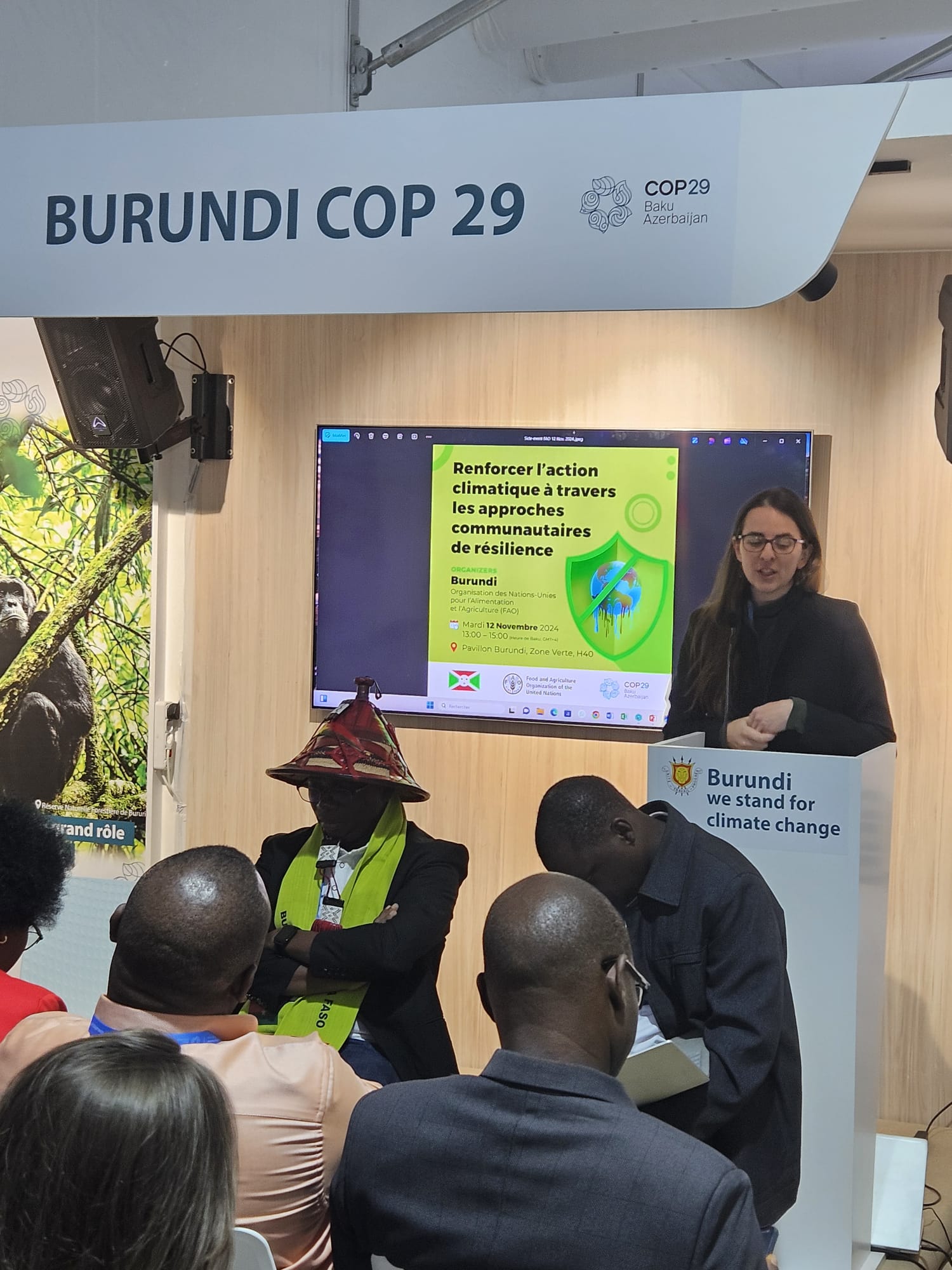
Strengthening Climate Action Through Community Resilience Approaches
12 November 2024 – Burundi Pavilion, FAO
The session highlighted innovative approaches to community resilience. Andréanne Martel presented the ReSea experience, highlighting :
- The successful integration of traditional knowledge in marine conservation
- The transformative role of women and youth leadership in coastal resource management
- The practical application of the IUCN Global Standard for Nature-based Solutions
Science, Partnerships and Climate Finance for Regenerative, Climate Resilient Seascapes
15 November 2024 – Science for Climate Pavilion
This multi-sector dialogue enabled Geneviève Morency to :
- Present the innovative ReSea model combining marine conservation and inclusive development.
- Share the data collected in the ReSea project, demonstrating the importance and relevance of a gender-transformative approach to actions relating to the governance of natural resources.
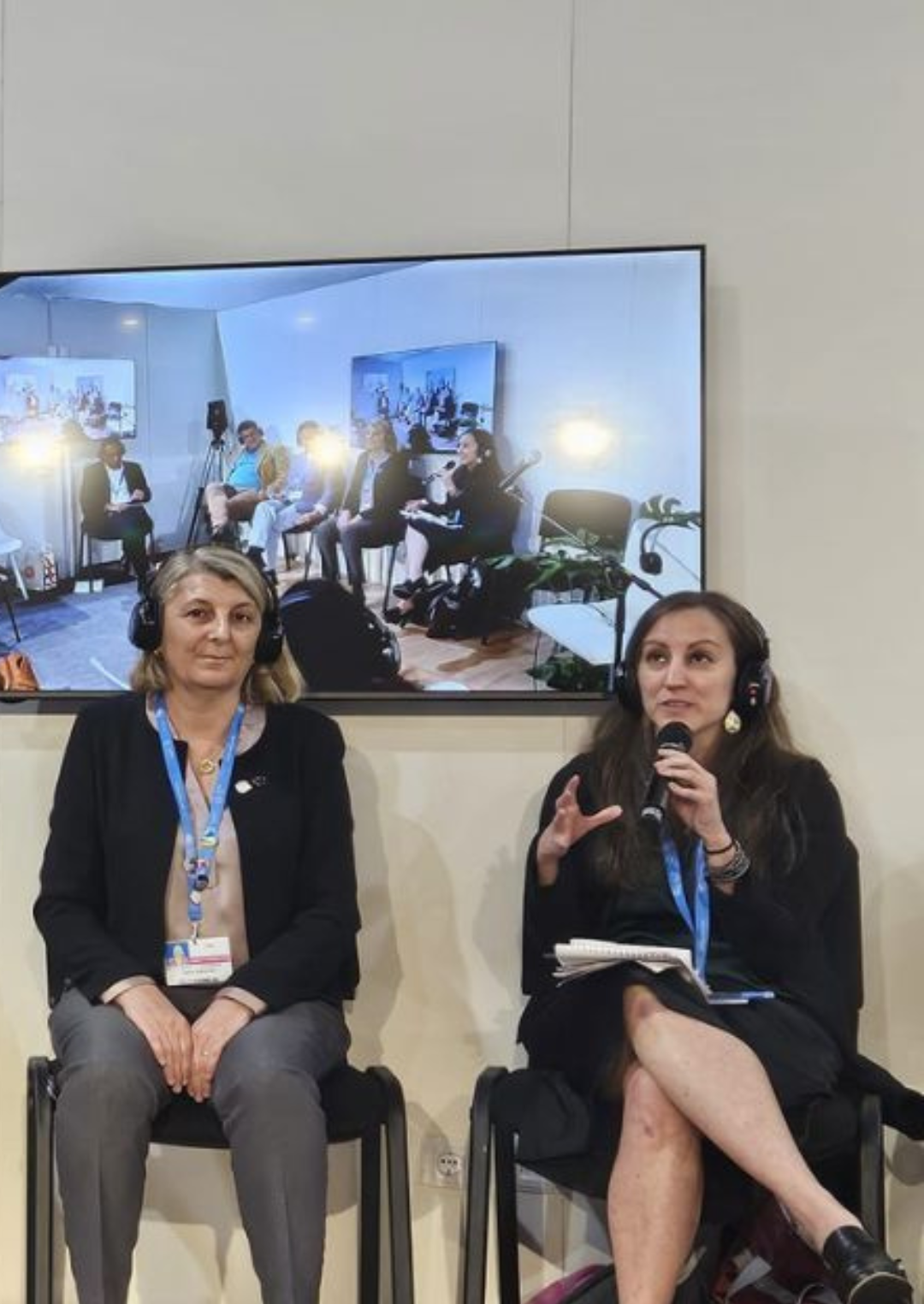
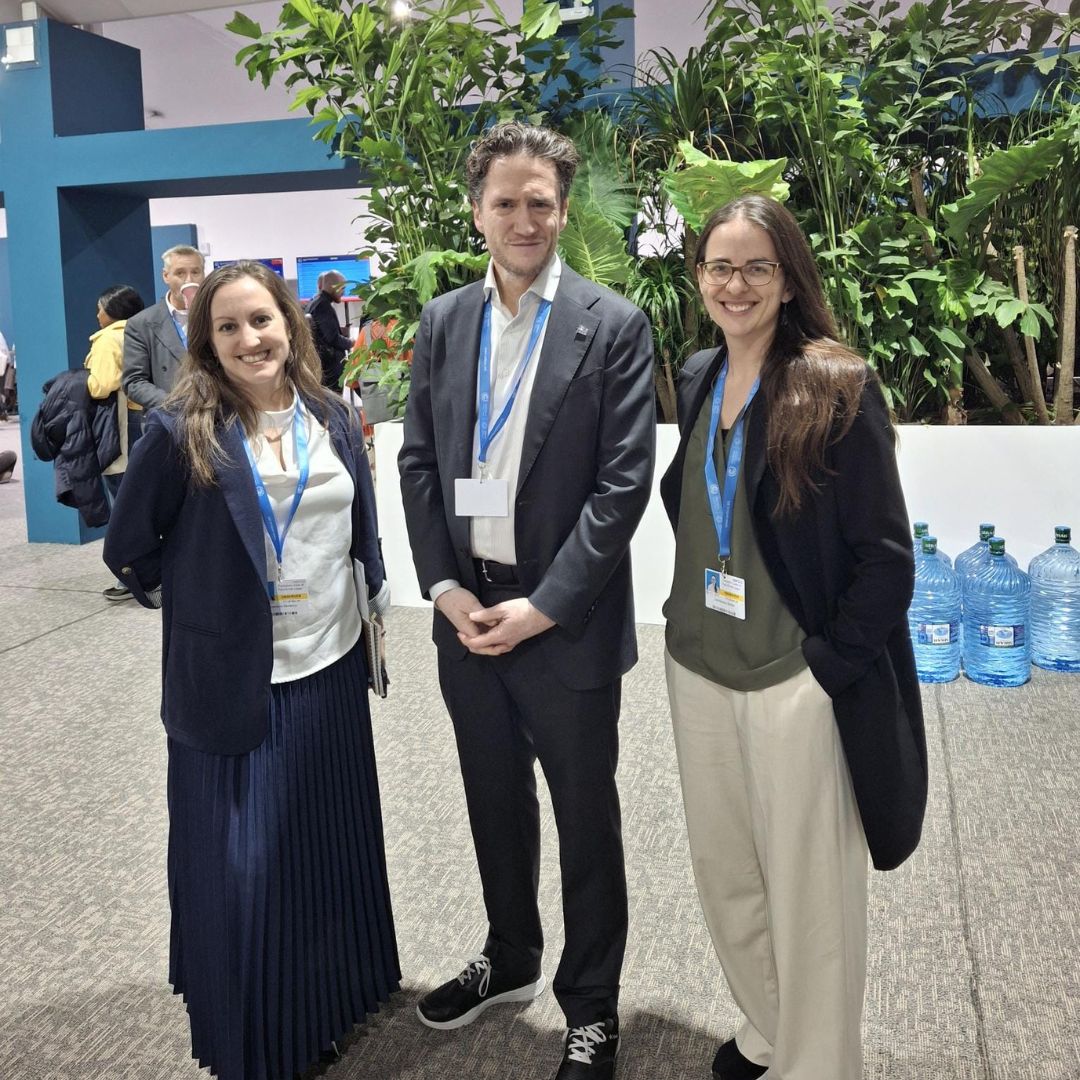
Baku Dialogue on Quebec’s international cooperation
16 November 2024 – Blue Zone
Geneviève Morency shared the successes of our projects, including :
- The achievements of the ABC project in Burkina Faso, including the installation of 419 functional biodigesters
- The importance of Quebec cooperation in international climate action and the importance of involving women in funded projects
Gender Data Alliance : The power of gender data for prioritization and transparency
19 November 2024 – Special Event Room Shirvan
Moderation of a round table by Geneviève Morency on the integration of gender data in climate adaptation processes:
- Discussion on the use of disaggregated and gender-sensitive data in National Adaptation Plans
- Sharing practical tools for monitoring and evaluating gender data in biennial transparency reports (BTRs)
- Identification of concrete actions to strengthen the collection and use of gender data at international, national and local levels
- Emphasis on the importance of disaggregated data to inform climate policies
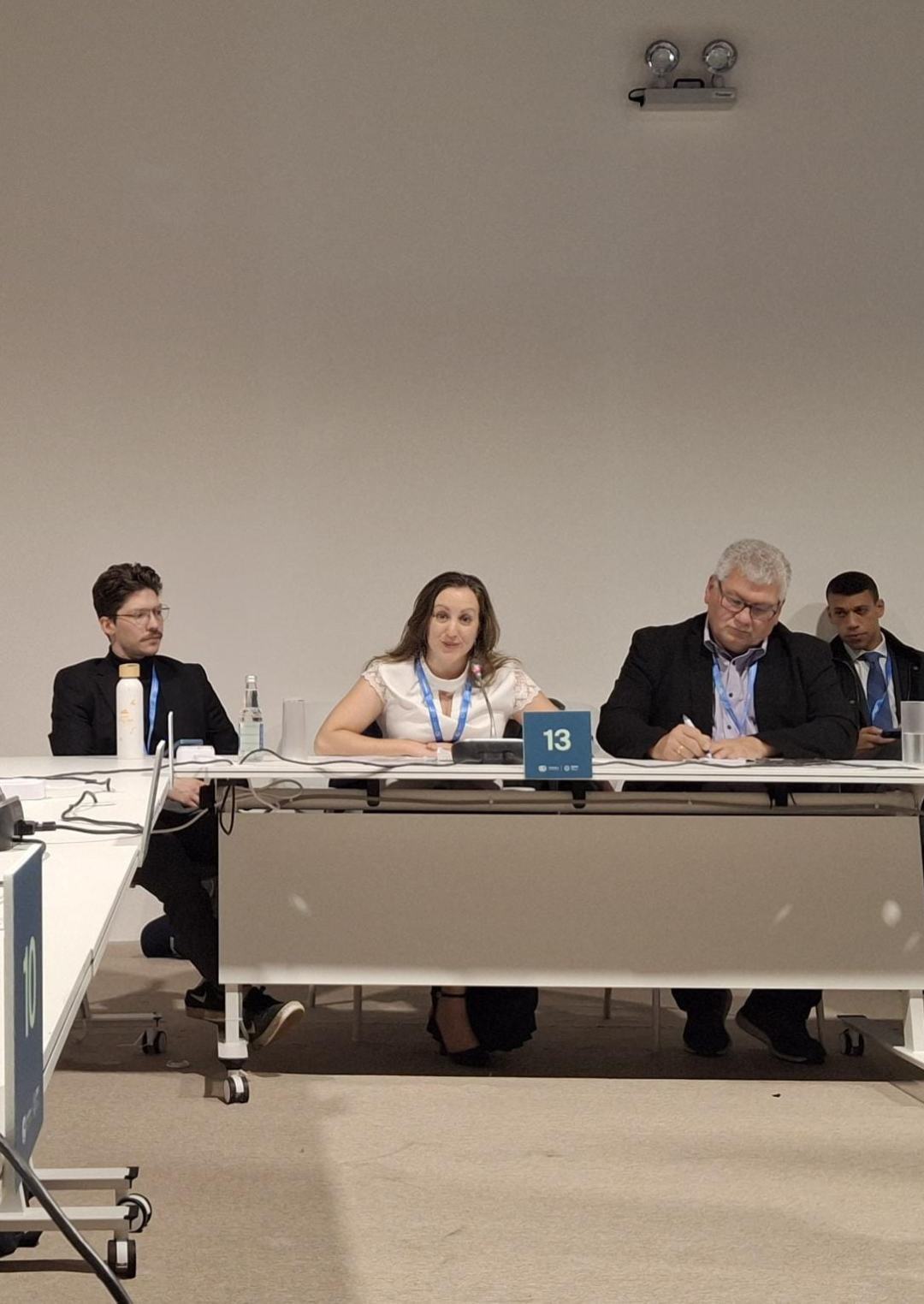
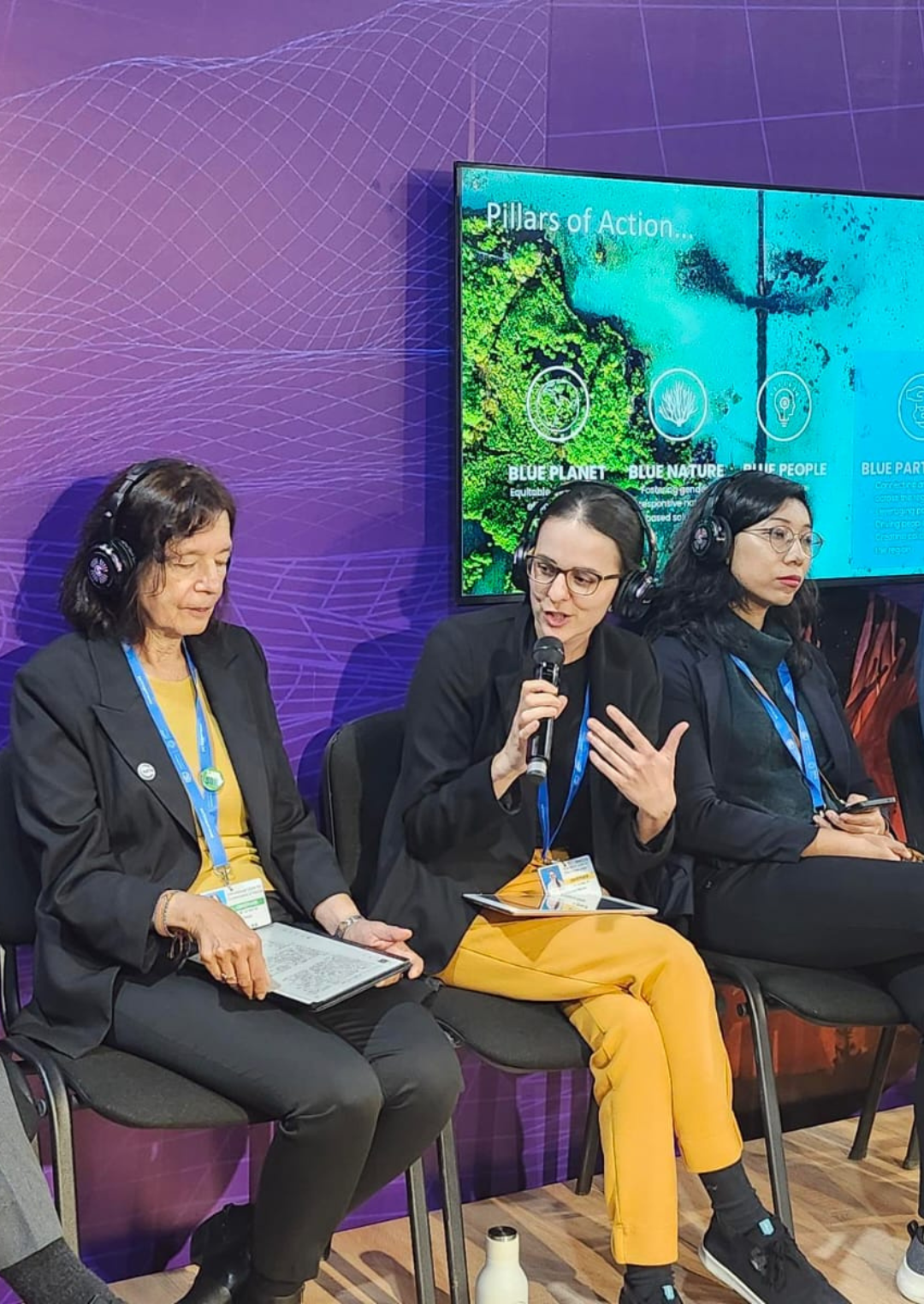
An integrated approach: Gender responsive Nature-based Solutions for Climate, Nature and People
19 November 2024 – Science for Climate Pavilion
Andréanne Martel took part in a dialogue between several international organisations working in different countries and implementing projects linking climate action with nature-based solutions:
- Exchange of various regional experiences
- Discussion on integrating the gender perspective into nature-based solutions
Climate justice now: perspectives from the South
21 November 2024 – Canada Pavillon
An event bringing together influential voices from the global South to share their analyses of the critical issues at stake at COP29 under the expert moderation of Andréanne Martel :
- The panel brought together speakers from Latin America, Africa and Asia.
- An urgent call was made for recognition of the climate debt owed by the countries of the global North.
- The participants called for increased climate financing that meets the real needs expressed by communities in the Global South, avoids the creation of new cycles of debt and ensures that funds are accessible to local and community organizations.
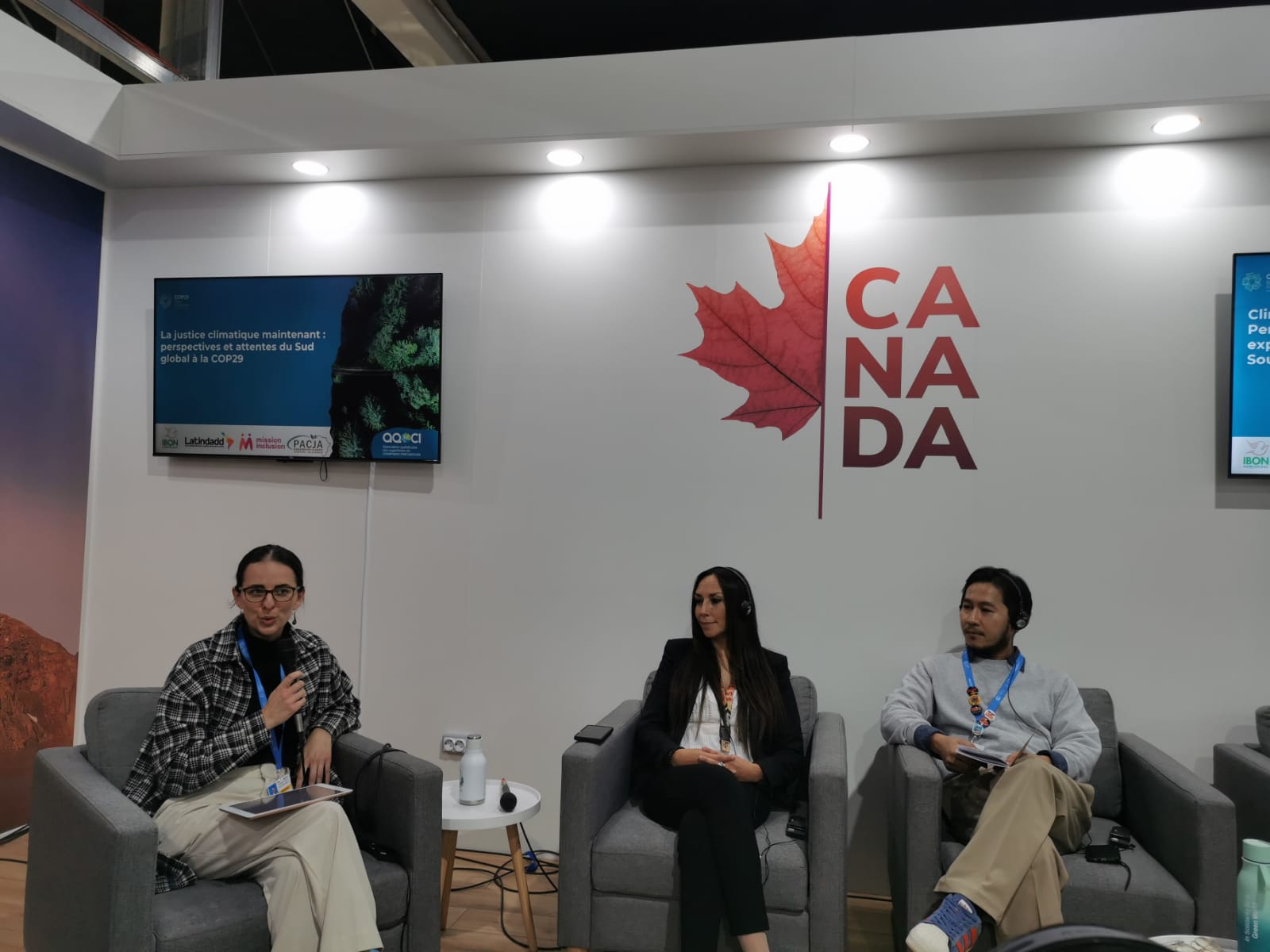
- Organised by AQOCI, the Association québécoise d’organismes de coopération internationale.
Highlights of our events
Strengthening Climate Action Through Community Resilience Approaches
12 November 2024 – Burundi Pavilion, FAO
The session highlighted innovative approaches to community resilience. Andréanne Martel presented the ReSea experience, highlighting :
The successful integration of traditional knowledge in marine conservation
The transformative role of women and youth leadership in coastal resource management
The practical application of the IUCN Global Standard for Nature-based Solutions
Science, Partnerships and Climate Finance for Regenerative, Climate Resilient Seascapes
15 November 2024 – Science for Climate Pavilion
This multi-sector dialogue enabled Geneviève Morency to :
- Present the innovative ReSea model combining marine conservation and inclusive development.
- Share the data collected in the ReSea project, demonstrating the importance and relevance of a gender-transformative approach to actions relating to the governance of natural resources.
Baku Dialogue on Quebec’s international cooperation
16 November 2024 – Blue Zone
Geneviève Morency shared the successes of our projects, including :
- The achievements of the ABC project in Burkina Faso, including the installation of 419 functional biodigesters
- The importance of Quebec cooperation in international climate action and the importance of involving women in funded projects
Gender Data Alliance : The power of gender data for prioritization and transparency
19 November 2024 – Special Event Room Shirvan
Moderation of a round table by Geneviève Morency on the integration of gender data in climate adaptation processes:
- Discussion on the use of disaggregated and gender-sensitive data in National Adaptation Plans
- Sharing practical tools for monitoring and evaluating gender data in biennial transparency reports (BTRs)
- Identification of concrete actions to strengthen the collection and use of gender data at international, national and local levels
- Emphasis on the importance of disaggregated data to inform climate policies
An integrated approach: Gender responsive Nature-based Solutions for Climate, Nature and People
19 November 2024 – Science for Climate Pavilion
Andréanne Martel took part in a dialogue between several international organisations working in different countries and implementing projects linking climate action with nature-based solutions:
- Exchange of various regional experiences
- Discussion on integrating the gender perspective into nature-based solutions
Climate justice now: perspectives from the South
21 November 2024 – Canada Pavillon
An event bringing together influential voices from the global South to share their analyses of the critical issues at stake at COP29 under the expert moderation of Andréanne Martel :
- The panel brought together speakers from Latin America, Africa and Asia.
- An urgent call was made for recognition of the climate debt owed by the countries of the global North.
- The participants called for increased climate financing that meets the real needs expressed by communities in the Global South, avoids the creation of new cycles of debt and ensures that funds are accessible to local and community organizations.
Our expectations for the final negotiations
We hope that the final negotiations will take into account the principles and initiatives that amplify the voice and power of the people and communities most affected by climate change:
1. Inclusive climate governance
- Promoting transformative gender approaches
- Establish representation quotas for those directly affected.
2. Fair climate finance
- Target 60% of bilateral funding in the form of grants
- Prioritize adaptation initiatives led by coastal communities
- Integrate gender equality into all projects
3. Sustainable local solutions
- Support initiatives that integrate local knowledge
- Develop a regenerative and inclusive blue economy
- Simplify access to finance for local organizations
4. Inclusive data
- Systematically collect disaggregated data
- Integrate social transformation indicators
- Support participatory monitoring and evaluation processes
Our expectations for the final negotiations
We hope that the final negotiations will take into account the principles and initiatives that amplify the voice and power of the people and communities most affected by climate change:
1. Inclusive climate governance
- Promoting transformative gender approaches
- Establish representation quotas for those directly affected.
2. Fair climate finance
- Target 60% of bilateral funding in the form of grants
- Prioritize adaptation initiatives led by coastal communities
- Integrate gender equality into all projects
3. Sustainable local solutions
- Support initiatives that integrate local knowledge
- Develop a regenerative and inclusive blue economy
- Simplify access to finance for local organizations
4. Inclusive data
- Systematically collect disaggregated data
- Integrate social transformation indicators
- Support participatory monitoring and evaluation processes

Andréanne Martel, ReSea Senior Project Manager:
![]() COP29 confirmed the urgent need to transform our approaches to climate financing. The discussions highlighted the relevance of our ReSea model, which combines the protection of marine ecosystems, inclusive governance and the economic empowerment of coastal communities, particularly women and young people.
COP29 confirmed the urgent need to transform our approaches to climate financing. The discussions highlighted the relevance of our ReSea model, which combines the protection of marine ecosystems, inclusive governance and the economic empowerment of coastal communities, particularly women and young people.
The message is clear: the future of climate action lies in local, inclusive and transformative solutions. ![]()

Andréanne Martel, ReSea Senior Project Manager:
![]() COP29 confirmed the urgent need to transform our approaches to climate financing. The discussions highlighted the relevance of our ReSea model, which combines the protection of marine ecosystems, inclusive governance and the economic empowerment of coastal communities, particularly women and young people.
COP29 confirmed the urgent need to transform our approaches to climate financing. The discussions highlighted the relevance of our ReSea model, which combines the protection of marine ecosystems, inclusive governance and the economic empowerment of coastal communities, particularly women and young people.
The message is clear: the future of climate action lies in local, inclusive and transformative solutions. ![]()
Geneviève Morency, Director, East Africa Programme:
![]() These two weeks of negotiations have reinforced our conviction that climate justice is inseparable from social justice. It is vital to ensure that gender and human rights are at the heart of the talks and discussions on climate action.
These two weeks of negotiations have reinforced our conviction that climate justice is inseparable from social justice. It is vital to ensure that gender and human rights are at the heart of the talks and discussions on climate action.
In our projects in both the Sahel and the western Indian Ocean, we can see fundamental gaps between men and women regarding participation in decision-making bodies and that the involvement of local communities, particularly women and young people, brings innovative solutions.
COP29 enabled us to demonstrate how projects with a transformative gender approach can bring about fundamental transformation in climate action on the ground, where women can have a voice. ![]()


Geneviève Morency, Director, East Africa Programme:
![]() These two weeks of negotiations have reinforced our conviction that climate justice is inseparable from social justice. It is vital to ensure that gender and human rights are at the heart of the talks and discussions on climate action.
These two weeks of negotiations have reinforced our conviction that climate justice is inseparable from social justice. It is vital to ensure that gender and human rights are at the heart of the talks and discussions on climate action.
In our projects in both the Sahel and the western Indian Ocean, we can see fundamental gaps between men and women regarding participation in decision-making bodies and that the involvement of local communities, particularly women and young people, brings innovative solutions.
COP29 enabled us to demonstrate how projects with a transformative gender approach can bring about fundamental transformation in climate action on the ground, where women can have a voice. ![]()
The work continues
Mission Inclusion continues its commitment to climate justice through transformative projects that put local communities at the heart of the action:
A flagship project in the western Indian Ocean, in partnership with IUCN and supported by Global Affairs Canada’s Partnerships for Climate, which demonstrates the effectiveness of a holistic approach combining marine conservation and inclusive development.
RCIM in Chad and ABC in Burkina Faso
These innovative initiatives, supported by the Quebec government’s Programme de coopération climatique internationale, strengthen the climate resilience of communities while promoting gender equality.
The work continues
Mission Inclusion continues its commitment to climate justice through transformative projects that put local communities at the heart of the action:
A flagship project in the western Indian Ocean, in partnership with IUCN and supported by Global Affairs Canada’s Partnerships for Climate, which demonstrates the effectiveness of a holistic approach combining marine conservation and inclusive development.
RCIM in Chad and ABC in Burkina Faso
These innovative initiatives, supported by the Quebec government’s Programme de coopération climatique internationale, strengthen the climate resilience of communities while promoting gender equality.

